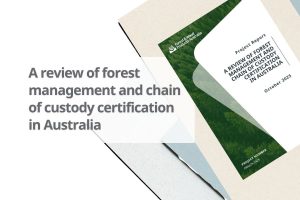Australian forest growers have identified new research priorities. These priorities are the impetus for the co-funding of six PhD research scholarships by FWPA forest grower members and the University of Tasmania (UTas).
The projects will cover a wide range of challenges, from the risk posed to plantations by browsing herbivorous mammals, to traits in genetic material that affect resistance to drought, heat, diseases and pests, as well as management approaches designed to maximise tree survival under various conditions.
The successful projects have the potential to help advance and build capacity in the priority research areas identified by growers. They will see forest managers work collaboratively with PhD students.
The Forest Growers Research Program (FGRP), which is supported by the Australian Government through matching funding with FWPA, is the result of ongoing conversations initiated in August 2020 between UTas and FWPA through its Grower Research Advisory Committee (GRAC).
“The University of Tasmania has a long history of successful, collaborative research with national and state-based forest industry partners,” said Julianne O’Reilly-Wapstra, Associate Professor in Biological Sciences at the UTas School of Natural Sciences and ARC Training Centre for Forest Value.
“Close working relationships between PhD students and industry partners ensure research projects remain industry focused, and that students are trained to be industry-ready.
“These relationships also ensure the outcomes and results of research are translated to industry partners in a timely and accessible manner. This all serves to create an excellent shared-learning environment.”
“Programs such as the FGRP help build capacity in the sector, while ensuring proactive practices that support the continued growth and productivity of the forestry industry through the development of innovative solutions to current and future grower challenges,” said Jodie Mason, FWPA’s Forest Research Manager.
The six projects to receive funding via the scholarships were selected by a working group of FWPA and forest grower members.
The projects, which are expected to commence this year and run for up to four years, were simultaneously advertised nationally and internationally, enabling successful PhD candidates to be recruited within a similar timeframe, and begin their work as a cohesive and collaborative cohort.
For each of the six successful projects, GRAC members and companies with a particular interest in that specific research area will become project partners and/or advisors, meeting regularly with supervisors and students in either a formal or informal capacity, allowing industry direct input into the projects.
During these meetings the project teams will discuss the development and potential refinement of their projects, next steps, issues and barriers to progress, solutions, required resources, the latest results, outcomes and implications, and any additional recommendations.
The six selected projects are:
Quantifying risks and the scale of the mammal browsing problem to inform technological solutions. Browsing by mammalian herbivores such as wallabies, possums and deer poses a significant issue for growers in native forests and plantations. This project will look to develop an accurate understanding of browsing risk to regeneration sites and plantations, as well as cost-effective monitoring and deterrent tools.
Maximising and maintaining site productivity. The ability to determine the drivers of site productivity and an understanding of optimal site management practices would help to maximise tree production. This project will therefore look to develop an understanding of these productivity drivers in hardwood plantations, and quantify the relationship between productivity, nutrients and water, and above and below ground tree processes.
Identification of elite eucalypt genetic material and molecular markers for contemporary and future risk traits. This project aims to develop an understanding of the genomic architecture of quantitative traits affecting resistance to drought, heat, diseases, and pests in Eucalyptus nitens. These stressors are expected to increasingly impact forests under climate change. This research will enable breeders to access molecular markers to help rank trees for novel and previously unmeasured traits, in support of their selection for breeding programs.
A similar project to the above will focus on the Exploration of models and systems for the inclusion of novel traits into Eucalyptus globulus breeding.
Biotic agents and site silvicultural practices: combined management approaches to maximise tree survival in hardwood plantations. There is a need to document the drivers of the poor survival of plantation trees, both in the early stages of planting and after they have become established. Significant gaps exist in our understanding of how above and below ground processes interact to affect tree survival. As well as improving knowledge of the drivers of tree survival across hardwood plantation species, this project will offer an understanding of the importance of below ground processes in tree survival, and the interaction between biotic agents and site management protocols.
Improved provenance choice for native forest silviculture and management in the face of climate change. Modifying the choice of seed sources to account for future climate is a major issue facing the managers of native Australian forests. Currently, most seed transfer guidelines are based on contemporary climate matching and the concept that ‘local is best’. This project will look at new approaches that account for predicted climate change, along with potential tools for their implementation.
Further information on each of these projects will be made available as they progress.



